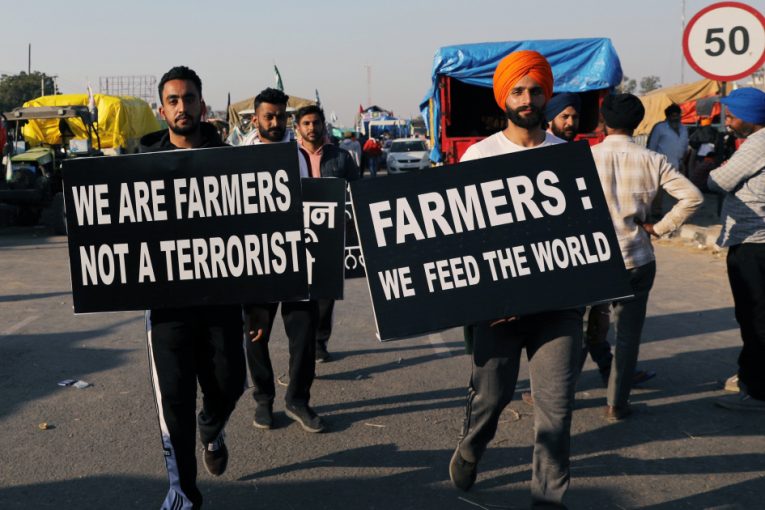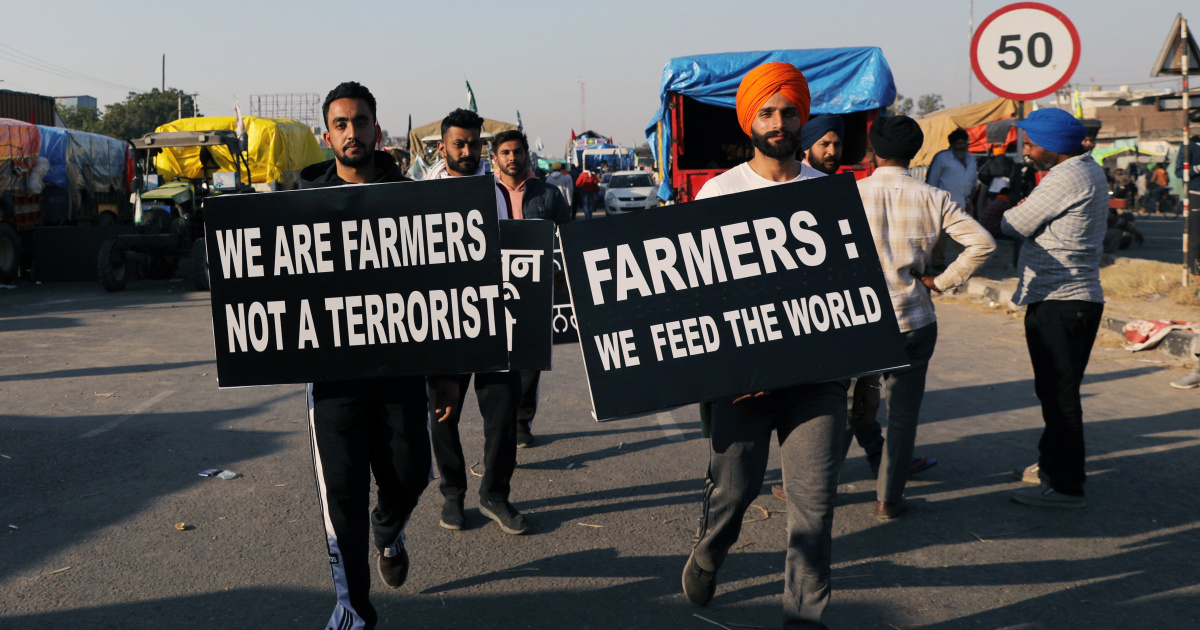

By Gurman Sidhu
INDIA – For months, farmers across India have been assembling in its capital city, New Delhi. They have been protesting against the three unfair agricultural bills which would allow large corporations to exploit them and further drive them into poverty.
On Jan. 26, 2021, the farmers and thousands of supporters carried out what was intended to be a peaceful march. They planned for over 200,000 tractors to parade through the capital while India’s Republic Day celebrations were underway.
The government and protest leaders decided that farmers will parade on specific routes, away from the national holiday celebrations. However, the routes assigned to the protestors were on the outskirts of the capital, pushing them out of the way, and some protestors who weren’t a part of the original movement decided to go off route. They were met with tear gas and police brutality.
Some of these protest groups even came together at the Red Fort of India. The leaders of the farmer’s movement immediately called off the march and expressed that they did not want anyone to disobey the guidelines created for the celebration. Though protestors weren’t violent, the Delhi police used batons, water cannons and tear gas to get rid of the farmers.
Ever since this small group of farmers who weren’t even with the original movement went off route, the Indian government has deemed this as an opportunity to violate their human rights. The government used this excuse to terrorize every single protestor in the city – to terrorize the entire movement.
The Indian government quickly began to establish barricades between the different places where farmers had established their camps and had been living for months. These barricades meant for the hundreds of thousands of farmers to not be able to meet each other. The government has also cut off the water supply to these regions, as well as their access to toilets.
Even more horrifying for these protestors is the government shutting off internet services where the protests are taking place. They are blocking media coverage and the exposure of the treatment of these farmers who are peacefully asking for a resolution. The borders surrounding the capital city are denying access to its very own citizens and media outlets.
Journalists have also been arrested and detained throughout the capital. Around 200 known protesters have been missing since late January, and many more have been abducted by badgeless police. Those that speak out against the injustice of the government are either disappearing or being met with brutality.
To understand the alarming threats these farmers face, it is important to know exactly who they are. India is a diverse country in itself. It is home to many groups of people and many religions. One of these specific groups is from the state of Punjabi, the home to the religion of Sikhism. Sikhs are only 1.72 percent of the country’s population. The overwhelming majority of the farmers who are protesting on the streets of India are from the state of Punjab and are Sikhs. Today people from several Indian states and backgrounds have come to the capitals borders in support.
For centuries, Sikhs, the people of Punjab as the minority population of India have been oppressed. Repeatedly, laws like these have been made to hurt them. Today, Sikhs across the world are coming together as people in the Indian Government and those who represent the majority of India are allowing and asking for more mistreatment of these protestors.
Kangana Ranaut, a famous Bollywood actor in India, has been spreading misinformation against the protestors. She has been misleading her supporters by addressing these peaceful protesters with words like “terrorists.” She and many others are using their platforms to dehumanize the farmers. Recently, she added a tweet that has infuriated supporters of the movement across all backgrounds and across the entire world.
In her tweet she states, “I feel so elated, I don’t even remember being so happy/excited ever, the cancer in the body of this nation we were looking for has been located, identified and now the process of eradication will start, together we will see this through. Not just survive but also thrive. Jai Hind.”
Many have taken to social media to express their concern that she is advocating for genocide – a genocide of those who support the movement and the people of Punjab. Twitter removed her tweets claiming that they violate community guidelines.
Such statements and actions by the Indian government have made it clear, the human rights of protestors and minorities in India are being violated.
As light has been brought to these violations, social media is witnessing a surge of support for the farmers. On Jan. 4, 2021, the United Nations Human Rights Council joined lawmakers and addressed its support for the rights of these protestors to speech and peaceful assembly both offline and online. Many leaders and foreign government officials have also publicly called for a stop to the human rights violation going on in India.
The support became even more widespread when figures with powerful voices in the United States came out with support for the movement. Greta Thunberg, an environmental activist, and Meena Harris, the niece of the US Vice President Kamala Harris have also tweeted in support of the farmers. Their support has been appreciated by many, yet they faced backlash in India. Some Indian nationalists who have been against the protestors have taken pictures of Thunberg and Harris to the streets and set them on fire. Thunberg and Harris have replied and stated that they will not be intimidated nor silenced.
Meena Harris and many others are also calling for the release of Nodeep Kaur, a labor rights activist who was unlawfully arrested by the Indian police and sexually assaulted while in custody. Kaur is now being held without bail and being denied medical examination. Her ongoing story is an example of what is going on in the capital of India.
Farmers are suffering. The rights of these farmers and the minority Sikh/Punjabi population of India are being violated. Over 204 dead protestors have been accounted for, and hundreds of thousands more are injured. Farmers of India are calling for everyone’s support and have loudly stated that they will not be backing down.
Gurman Sidhu is a first year Neurobiology, Physiology, and Behavior major at UC Davis from Union City, California.




